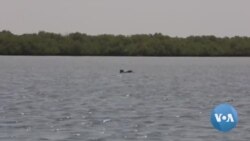A dense labyrinth of mangroves weaves through Senegal’s Sine Saloum Delta for hundreds of kilometers. Within the salty channels swims one of the rarest dolphin species in the world — the Atlantic humpback dolphin.
With just 1,500 remaining on the planet, the species is classified as critically endangered.
Scientists believe Sine Saloum is home to 300, making it the humpback dolphins there the largest single population.
But the dolphins, named for the peculiar hump that gives way to its dorsal fin, face numerous threats in the delta, including pollution, coastal development and, most problematically, entanglement in nylon monofilament fishing nets.
The nets are transparent underwater, making it easy for wildlife such as sharks, turtles, seabirds and fish to get trapped inside. They’re also strong, making it nearly impossible for them to get out.
“Monofilament nets are extremely problematic,” said Lucy Keith-Diagne, executive director of the African Aquatic Conservation Fund. “Dolphins and certainly manatees have a behavior that when they get caught in the net, they spin, and that entangles them even more.”
The nets frequently get stuck to rocks on the seafloor, causing fishermen to abandon them. There, they continue to fish in silence for decades — a phenomenon known as ghost fishing.
Senegal banned the import, sale, purchase and use of monofilament nets in 1987. Updated versions of the law were passed in 1998 and 2015, but the nets can still be seen in nearly every fishing port and boat throughout the country.
“Fishers are using a lot of monofilament nets. And we know it's illegal, but still they are using it, so it's not enforced,” said Diana Seck, a research assistant with the African Aquatic Conservation Fund.
Government agents are charged with protecting Sine Saloum’s unique ecosystem, but critics say enforcement is nonexistent.
“If we come across someone who uses types of gear that are prohibited in the marine-protected area, then we make them aware,” said Samba Ndiaye, a head officer within the Gandoule Marine Protected Area of Sine Saloum.
A second violation should result in a fine, he said. But when VOA accompanied Ndiaye and another officer on a recent patrol, several boats openly carrying the illegal nets were ignored — not a single fine or warning was issued.
The other officer, Babacar Thior, said he wasn’t even sure if the nets were banned.
“For the last five or 10 years, we’ve heard some people say monofilament nets are prohibited. But the law has yet to be applied,” he said. “It kills everything and must be banned, but everyone uses it.”
Senegal’s director of marine fisheries, Diene Faye, also acknowledged the nets are still used, but insisted the ban is enforced.
“Even if there’s an impact on resources, I can’t say that it’s a considerable impact, because we continue to have fish,” he said.
A 2019 assessment conducted by the United Nations’ Food and Agriculture Organization found the depletion of coastal fish stocks posed a serious threat to food security in the region.
Senegalese fishermen have repeatedly raised the alarm over their diminishing catch.
Faye said his ministry was devising a plan to replace the country’s monofilament nets with cotton alternatives. Cotton nets can still entrap wildlife, but they are more easily visible and are biodegradable.
Faye could not provide a date for the rollout of the project.
Some citizens have begun taking it upon themselves to mitigate the damage. Nongovernmental organization Oceanium Dakar leads scuba diving outings to remove fishing nets that litter Senegal’s ocean floor.
“The fishermen use the nets and don’t even try to hide it. They don’t hide it because no one is stopping them,” said Rodwan El Ali, who heads the initiative.
El Ali grew up diving in Senegal’s waters and said he’s witnessed a substantial increase in marine pollution and overfishing.
“In Senegal, anyone can fish whatever they want, when they want, how they want. Here, no one will stop you,” he said.
Illegal fishing practices such as spearfishing with a scuba tank and bottom trawling are strongly enforced elsewhere, he said. But in Senegal, they’re commonplace.
So long as authorities fail to enforce the net ban, conservationists say Senegal’s dolphins and other marine life will continue to pay the price.
“Until we remove the nets, they will continue to destroy everything, for nothing, for no one,” El Ali said. “It’s pure waste.”













